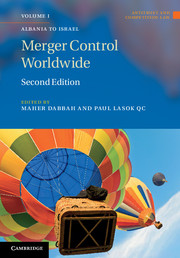Book contents
- Frontmatter
- Contents
- Preface
- List of Contributors
- Table of cases
- Table of Legislation and Official Guidance
- Introduction
- Albania
- Argentina
- Armenia (Republic of Armenia)
- Australia
- Austria
- Barbados
- Belgium
- Bosnia and Herzegovina
- Brazil
- Bulgaria (Republic of Bulgaria)
- Canada
- Chile
- China*
- Costa Rica
- Croatia
- Cyprus (Republic of Cyprus)
- Czech Republic
- Denmark
- Estonia
- European Economic Area
- European Union
- Finland
- France
- Germany (Federal Republic of Germany)
- Greece
- Hong Kong
- Hungary
- Iceland
- India
- Indonesia (Republic of Indonesia)
- Ireland
- Israel
- Italy
- Japan
- Kenya
- Korea
- Latvia
- Lithuania
- Macedonia (Republic of Macedonia)
- Malta
- Mexico
- Netherlands (The Netherlands)
- New Zealand
- Norway
- Pakistan
- Peru
- Philippines (Republic of the Philippines)
- Poland
- Portugal
- Romania
- Russia
- Serbia
- Singapore
- Slovakia (Slovak Republic)
- Slovenia
- South Africa
- Spain
- Sri Lanka
- Sweden
- Switzerland
- Taiwan
- Thailand
- Tunisia (Republic of Tunisia)
- Turkey
- Ukraine
- United Kingdom
- United States of America
- Uzbekistan
- Venezuela
- Zambia
- Index
Chile
Published online by Cambridge University Press: 05 November 2014
- Frontmatter
- Contents
- Preface
- List of Contributors
- Table of cases
- Table of Legislation and Official Guidance
- Introduction
- Albania
- Argentina
- Armenia (Republic of Armenia)
- Australia
- Austria
- Barbados
- Belgium
- Bosnia and Herzegovina
- Brazil
- Bulgaria (Republic of Bulgaria)
- Canada
- Chile
- China*
- Costa Rica
- Croatia
- Cyprus (Republic of Cyprus)
- Czech Republic
- Denmark
- Estonia
- European Economic Area
- European Union
- Finland
- France
- Germany (Federal Republic of Germany)
- Greece
- Hong Kong
- Hungary
- Iceland
- India
- Indonesia (Republic of Indonesia)
- Ireland
- Israel
- Italy
- Japan
- Kenya
- Korea
- Latvia
- Lithuania
- Macedonia (Republic of Macedonia)
- Malta
- Mexico
- Netherlands (The Netherlands)
- New Zealand
- Norway
- Pakistan
- Peru
- Philippines (Republic of the Philippines)
- Poland
- Portugal
- Romania
- Russia
- Serbia
- Singapore
- Slovakia (Slovak Republic)
- Slovenia
- South Africa
- Spain
- Sri Lanka
- Sweden
- Switzerland
- Taiwan
- Thailand
- Tunisia (Republic of Tunisia)
- Turkey
- Ukraine
- United Kingdom
- United States of America
- Uzbekistan
- Venezuela
- Zambia
- Index
Summary
Relevant legislation and statutory standards
Decree Law 211 of 1973, Ley para la Defensa de la Libre Competencia (‘the Competition Law’), is the Chilean legislation devised to regulate, promote and defend free competition in the Chilean markets. It provides the means of correcting, prohibiting and punishing conducts against free competition in economic activities and their attendant sanctions.
The Competition Law underwent sweeping reforms through Law 19610 of 1999, Law 19911, in effect since 12 February 2004, and Law 20361, in effect since 12 October 2009.
Law 19610 increased the power and authority of the Fiscalía Nacional Económica (‘the Fiscalía’), in charge of investigating and prosecuting violations of competition rules. Law 19911 is the most radical reform to the competition rules ever adopted in Chile. This legislation effected the following changes:
The Tribunal de Defensa de la Libre Competencia (‘the Tribunal’) was created. This court replaced the previous competition authorities that existed in Chile since 1973, namely the Comisiones Preventivas, one for each Administrative Region of Chile, the Comisión Preventiva Central, seated in Santiago, and the Comisión Resolutiva.
New procedures were implemented whereby the cases under the jurisdiction of the Tribunal will be resolved.
Anti-competitive conduct will no longer be penalised under criminal legislation; however, ines are more severe and the managers and directors of the entity found in violation will be held jointly and severally liable.
- Type
- Chapter
- Information
- Merger Control Worldwide , pp. 284 - 309Publisher: Cambridge University PressPrint publication year: 2012



